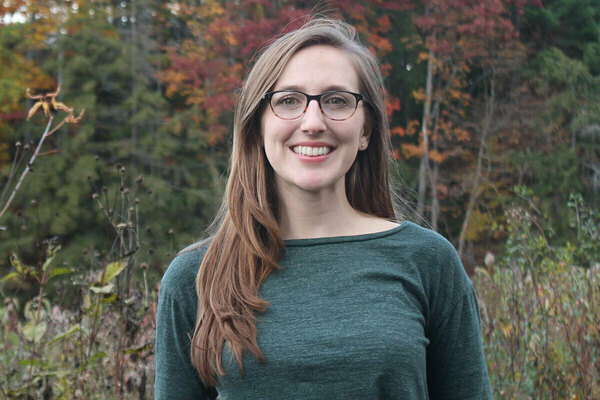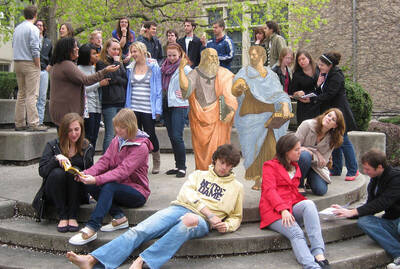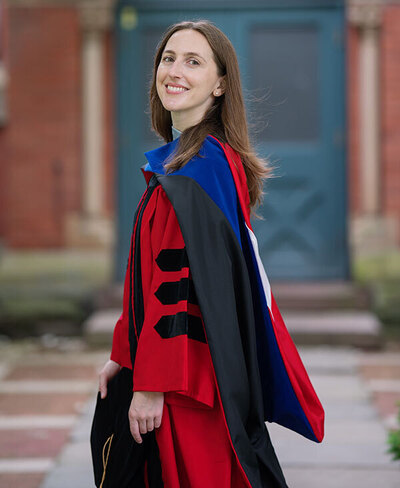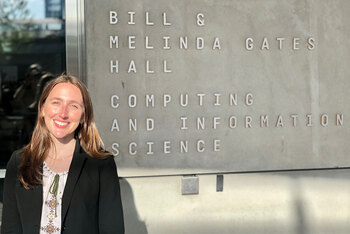
For Maria Antoniak ’11, a liberal arts education isn’t about having all the answers — it’s about learning what questions to ask.
After four years studying great books in the Program of Liberal Studies, she’s now spent nearly a decade working in data and computer science across industry, nonprofit, and academic settings.
In each, she’s relied upon foundational thinking skills she developed in College of Arts & Letters courses.
“The background of PLS helps me engage critically with a dataset,” Antoniak said. “Asking creative and critical and pertinent research questions that try to get at the heart of things as quickly as possible — that comes partly from PLS and diving deeply into a text.”
Carving out time
Though Antoniak entered Notre Dame as a physics major, she was drawn to the liberal arts and the promise of engaging with classic works.
At a fair for students looking to explore the variety of majors offered at Notre Dame, Antoniak was intrigued by the diverse group of people in PLS — an interdisciplinary major consisting of small, discussion-based seminars centered around writing by many of the most influential thinkers in the Western tradition.

“One of the most valuable things about PLS is this beautiful luxury to spend precious time engaging with some of the greatest things that human beings have produced,” Antoniak said. “That, to me, is PLS — it's this carving out of time to engage with the books.”
Antoniak learned to carve out this space for introspection throughout her college experience.
During eight weeks of volunteer work at the Lopez Island Family Resource Center in Washington through the Center for Social Concerns’ Summer Service Learning Program, she also studied and wrote nature poetry in a directed readings course with Professor Emeritus Henry Weinfield. And she taught poetry and writing for two summers in Assisi, Italy, and also spent three years as a tutor in the Writing Center on campus, helping other students refine their thinking across disciplines and course levels.
“It was great training for teaching and for understanding the value of writing,” she said.
When deciding on her next step after graduation, Antoniak aimed to combine interests that had flourished at Notre Dame — her passion for teaching and mentoring; her love for traveling abroad; and her interest in linguistics, which she strengthened by studying Italian, French, and Russian.
So she took a position teaching English at the Ukrainian Catholic University, a place unlike anywhere she had traveled before, and one that allowed her to connect with her Ukrainian heritage.
“I could see how that was really good for me as a human being — to meet different people, see different ways of living,” she said. “And I wanted more of that.”
“One of the most valuable things about PLS is this beautiful luxury to spend precious time engaging with some of the greatest things that human beings have produced. That, to me, is PLS — it's this carving out of time to engage with the books.”
When passions ‘click’
After a year of teaching, Antoniak was ready to return to being a student and forge a new career path.
She had happened to read about the field of computational linguistics and natural language processing, or the study of language from a computer science perspective.
“Knowing that there is this field of computer science that is combined with linguistics and human language, which I also love, that just seemed to click for me,” she said.

So she enrolled in a master’s in computational linguistics at the University of Washington in her home state, where she took courses across linguistics, programming, machine learning, and more. After earning her degree, she worked as a data scientist at a startup in Seattle, but returned to academia in order to continue her research in natural language processing.
As a Ph.D. student in information science at Cornell University, Antoniak’s research used machine learning to analyze how people write about themselves, their interests, and their personal experiences online — ranging from reviews posted on the book-centric social networking site Goodreads to personal birthing narratives shared in healthcare support communities.
“In my research, I've thought about why people are sharing these stories in these particular settings,” she said. “Computationally, can we model these narratives in an unsupervised way in order to pick out both general patterns in these stories and outliers, and also to measure who is framed as having power and lacking power?”
Now, asking the right questions helps direct how Antoniak works with datasets using artificial intelligence tools.
“Where my research in natural language processing relies on some of that education is in thinking critically,” Antoniak said, “whether that is approaching ethical problems in natural language processing and machine learning, because these tools are now used in government settings and in applications that we all use every day, or also in approaching research problems.”
‘Engaging with being human’
Antoniak explored working in industry through internships at Pacific Northwest National Laboratory, Microsoft, Facebook, and Twitter, but eventually decided that she wanted to work in a different type of research environment.

After graduating from Cornell, Antoniak joined a postdoctoral program at the Allen Institute for AI, a research center dedicated to exploring how AI and engineering can provide good to society and humanity. The nonprofit, founded by the late Microsoft co-founder Paul Allen, strives to do good in the world — a mission that resonated with Antoniak after her time at Notre Dame.
To Antoniak, the value of a liberal arts education is in becoming a better, deeply engaged person who is prepared to tackle the pressing ethical dilemmas of our time. And she’s found that it prepared her and her classmates to ask critical questions across a variety of career paths and disciplines upon their graduation.
“My class graduated during the recession, but we went on to be lawyers, journalists, scientists, writers, parents, teachers, businesspeople,” Antoniak said. “We had the confidence and grounding given to us by our hours of reading and debating and engaging with being human.”
“My class graduated during the recession, but we went on to be lawyers, journalists, scientists, writers, parents, teachers, businesspeople. We had the confidence and grounding given to us by our hours of reading and debating and engaging with being human.”
Originally published by at al.nd.edu on February 21, 2023.